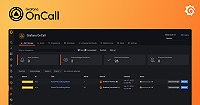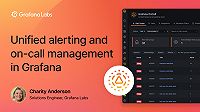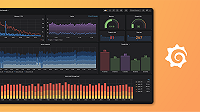Caution
As of 2025-03-11, Grafana OnCall OSS has entered maintenance mode, and will be archived on 2026-03-24. No further feature development will occur; however, we will still provide fixes for critical bugs and for valid CVEs with a CVSS score of 7.0 or higher. For more information, refer to our blog post.
Important: This documentation is about an older version. It's relevant only to the release noted, many of the features and functions have been updated or replaced. Please view the current version.
Escalation Chains and Routes
Escalation chains and routes for Grafana OnCall
Administrators can create escalation policies to automatically send alert group notifications to recipients. These policies define how, where, and when to send notifications.
Escalation policies dictate how users and groups are notified when an alert notification is created. They can be very simple, or very complex. You can define as many escalation configurations for an integration as you need, and you can send notifications for certain alerts to a designated place when certain conditions are met, or not met.
Escalation policies have three main parts:
- User settings, where a user sets up their preferred or required notification method.
- An escalation chain, which can have one or more steps that are followed in order when a notification is triggered.
- A route, that allows administrators to manage notifications by flagging expressions in an alert payload.
Escalation chains
An escalation chain can have many steps, or only one step. For example, steps can be configured to notify multiple users in some order, notify users that are scheduled for on-call shifts, ping groups in Slack, use outgoing webhooks to integrate with other services, such as JIRA, and do a number of other automated notification tasks.
Routes
An escalation workflow can employ routes that administrators can configure to filter alerts by regular expressions (outdated) or Jinja2 templates in their payloads. Notifications for these alerts can be sent to individuals, or they can make use of a new or existing escalation chain.
Configure escalation chains
You can create and edit escalation chains in two places: within Integrations, by clicking on an integration tile, and in Escalation Chains. The following steps are for the Integrations workflow, but are generally applicable in both situations.
You can use escalation chains and routes to determine ordered escalation procedures. Escalation chains allow you to set up a series of alert group notification actions that trigger if certain conditions that you specify are met or not met.
Click on the integration tile for which you want to define escalation policies.
The Escalations section for the notification is in the pane to the right of the list of notifications. You can click Change alert template and grouping to customize the look of the alert. You can also do this by clicking the Settings (gear) icon in the integration tile.
Create an escalation chain.
In the escalation pane, click Escalate to to choose from previously added escalation chains, or create a new one by clicking Make a copy or Create a new chain. This will be the name of the escalation policy you define.
Add escalation steps.
Click Add escalation step to choose from a set of actions and specify their triggering conditions. By default, the first step is to notify a slack channel or user. Specify users or channels or toggle the switch to turn this step off.
To mark an escalation as Important, select the option from the step Start dropdown menu. User notification policies can be separately defined for Important and Default escalations.
Create a route
To add a route, click Add Route.
You can set up a single route and specify notification escalation steps, or you can add multiple routes, each with its own configuration.
Each route added to an escalation policy follows an IF, ELSE IF, or ELSE path and depends on the type of alert you
specify using a Jinja template that matches content in the payload body of the first alert in alert group. You can also
specify where to send the notification for each route.
For example, you can send notifications for alerts with {{ payload.severity == "critical" and payload.service == "database" }} (Check Jinja2 reference) in the payload to an escalation chain
called Bob_OnCall. You can create a different route for alerts
with the payload {{ "synthetic-monitoring-dev-" in payload.namespace }} and select a escalation chain called
NotifySecurity.
NOTE: When you modify an escalation chain or a route, it will modify that escalation chain across all integrations that use it.



